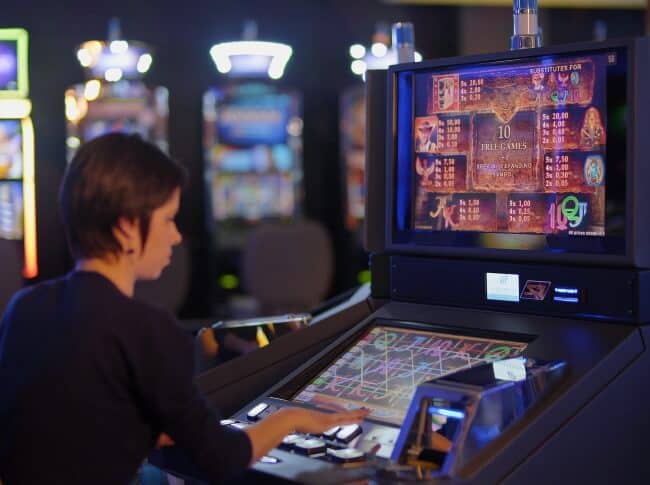Cocaine Addiction: what is it, the dangers and help available
What is cocaine? Cocaine is a highly addictive and illegal stimulant that is produced from the leaves of a[...]
Gambling can be instilled in someone from an early age or it can be learnt later in life. As a child, I can remember being taken to the slot machines at the visiting fair or to those on the pier on holiday by my father. I shared the pleasure that he got from feeding the one armed bandits with coins, pulling the handle (as was the case in those days, hence the name), and watching the fruits roll round and settle. The stakes were low (an old penny at the start) and the rewards were modest (12 pence for Bell, Bell, Bell) but it brought us innocent pleasure. My mother was slightly disapproving and sometimes we would be told not to tell her that dad had taken us to the pier on holiday, but on the whole it was harmless fun.
My early memories also include my father completing his football pools coupon each week – and occasionally playing ‘spot the ball’. He always told us of what we would do as a family ‘when we won the pools’. We never did have that big elusive win – though the fact that we knew someone who did probably kept the dream alive. My dad did enjoy a little gamble, both for the thrill of the small risk stakes and the prospect that one day he might get that big win.
He did not bet more than he could afford to lose and it was not detrimental to us in any way.
However, for some people these experiences as a child can affect their own propensity to gamble. I have met addicts since who were introduced to gambling by their relatives, their early experiences even being with their grandparents. From an early age they went to arcades with their grandparents and when there was a win, they were rewarded too – setting up a connection between gambling, winning and the associated reward, without necessarily being aware of the other side of the coin, especially all the financial loss incurred.
Gambling today has come a long way from the days when it involved slot machines, football pools and spot the ball. Of course even back in those days there were people gambling in card games, in betting shops and, for the more ‘sophisticated’ gambler, there was the lure of the casino. Now we have various authorised lotteries, scratch cards, bets can be placed on just about anything in a betting shop, and of course there is online gambling in all its various formats, in which people can participate without even leaving their home. This offers a whole new world of gambling prospects and experiences.

So why do people gamble and so get themselves on the path to becoming an addict? Some start finding it harmless fun. It can add a dimension to watching a game or tournament if you have a financial interest in who wins (even if only small). Sweepstakes at work are a case in point; as are occasional bets on big sporting tournaments or events. However, even if you are lucky enough to win a large sum on a bet, or on something like the lottery, it is highly unlikely that this will repeat itself. Gambling is never likely to be a way of coming into the money or getting you out of a debt problem. Most people recognise this.
Others however do not seem to understand this in the same way. So what happens for this small minority that they cannot keep their gambling as a harmless fun activity, but instead allow it to get a grip on them to the point that it gets out of control and becomes a gambling addiction?
In some ways, a gambling addiction is similar to other addictions. Some people find gambling offers them a means of escape from their reality. It may be a means of escaping how they are feeling that day or in that moment, or a means of escaping their feelings more generally – feelings such as anxiety, stress or depression. They may be escaping feelings of low self worth, childhood issues, or even simply boredom. They may be looking for a buzz or want to feel the high that they get from gambling. To put it in a nutshell, people who develop a gambling addiction tend to do so for emotional rather than financial reasons.
So gambling offers a temporary means of escape. However the behaviours and after effects associated with gambling addiction are also similar to other addictions.
As the alcoholic whose first drink will lead to more and more, and the drug addict’s drug use will escalate (possibly with the drugs increasing in strength), so the gambler’s pattern of addiction will be progressive and worsen. The addictive gambler will either start using one form of gambling and move on to others, or use more and more of the same form. The gambler will bet ever larger amounts and will be always chasing that ‘big win’. They will take on the typical addict traits of being secretive, anxious, moody, unreliable. While the family may be extremely worried about what is going on – even suspecting that gambling addiction is involved – the individual is likely to be self absorbed, low in mood and in confidence and lacking in self worth.
Like the alcoholic and drug addict, the gambler will experience similar feelings including:
As with other addictions, the gambling addict has to want to change in order to address their addiction. However, the desire to stop will not necessarily just come upon them. Sometimes it is the people who care about the gambler who have to bring them to this point, by making the consequences of their gambling sufficiently serious that they have little option but to stop.